By David P. Diaz, Ed.D.
Scientific disciplines have undergone tremendous change in the last 50 years, and not always for the better. Researching, writing, and submitting articles for publication have always been a feature of academic life. However, what was once a more straightforward process is now primarily influenced by certain highly regarded controlling factors: the quantity of publications, the perceived quality of the journals in which papers are published, the prestige of the journals that are cited, and the procurement of grant money for supporting the research. Most, if not all, of these factors tend to dictate the scope and focus of research.1
While science has repeatedly produced positive results, there often seems to be a naïve attitude toward the sciences by the general public. Too few people question the capabilities of science and too many think that science holds the answers to all questions. This attitude betrays a general misunderstanding of the limits of science. Those limits are the subject of the rest of this essay.
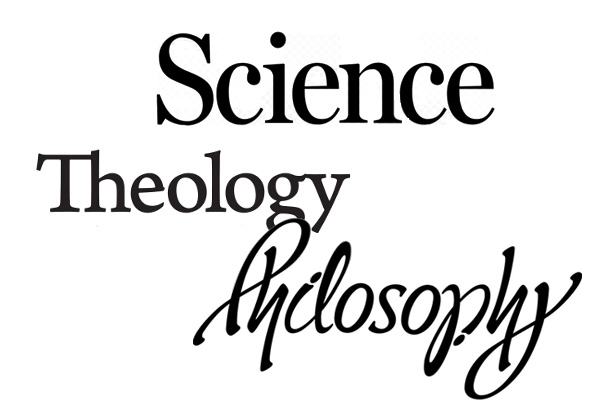
The Importance of Disciplines Besides Science
Throughout this essay I will use the word science to refer primarily to the natural sciences such as physics, astronomy, chemistry, geology, biology, and so on. However, it should not be forgotten that there are other fields that fall under the general rubric of “science.” The social sciences include such disciplines as sociology, political science, psychology, anthropology, and economics. And, there are the formal sciences, which include mathematics, computer science, and statistics. Outside of the sciences, the domain of humanities includes the fields of philosophy, theology, visual and performing arts, geography, history, and languages. I submit that all of these are important in helping us to understand the diverse concepts and truths of our world.2
The attainment of truth and knowledge is an interdisciplinary enterprise. It is therefore necessary to recognize and appreciate the role and importance of the domains that overlap and complement science. Among the many disciplines noted above, I believe that philosophy and theology are especially important. And yet, these two disciplines, in particular, have come under sustained scrutiny and attack in recent years, principally from the scientific sector. Whether out of ignorance or fear, many people have challenged the legitimacy of philosophy and theology. I would be the first to acknowledge the successes of science, but I would also warn that such accomplishments might have seduced the uninformed public—and even some scientists—into believing that science can provide final (i.e., ultimate) answers to every important question. I believe this to be a false and dangerous presupposition.
The Role of Philosophy and Theology
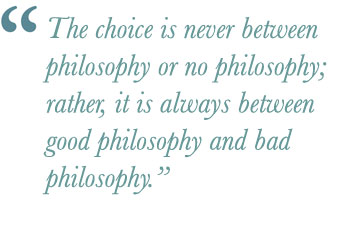
First of all, any who attempt to dismiss philosophy, typically fall victim to bad philosophy. Professor emeritus of Philosophy, Mark M. Hanna, has pointed out: “The choice is never between philosophy or no philosophy; rather, it is always between good philosophy and bad philosophy (1981, p. 11).” For example, everyone has a philosophy of life, which is often called a worldview.3 The question is not whether one holds a worldview, but whether one’s worldview is complete or incomplete, rational or irrational, true or false, precise or fuzzy.
Philosophy is the rational, critical assessment of basic human beliefs and, as such, it is foundational to every domain of knowledge. It is the role of philosophy to examine and analyze presuppositions, clarify concepts, and explain the ramifications of most every discipline, including science. Rigorous thinking and critical argumentation have been the earmarks of philosophy’s pursuit of intellectual clarity. The mission of philosophy is nothing short of finding the truth about the most crucial questions that reflective humans have continually sought to answer. In this respect, philosophy could not be more crucial in helping us understand the nature of truth and knowledge.
It is essential to employ reason, critical thinking, and the principles of logic when conducting scientific research. These represent important tools for analyzing one’s data, for understanding the literature germane to one’s research topic, and, ultimately, for developing accurate conclusions. The process of identifying, learning, and understanding these principles properly belongs within the purview of philosophy. To develop a consistent and intellectually adequate worldview, one needs to draw from all areas of knowledge; and philosophy should certainly be at the top of that list.
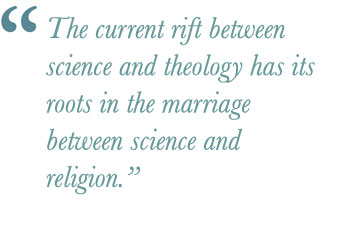 Theology has also had a long, if sometimes tumultuous, relationship with science. The current rift between science and theology has its roots in the marriage between science and religion. Almost all of the early thinkers—including scientists, mathematicians and philosophers—were devout believers in God. Galileo, Pascal and Leibnitz all heard God’s “voice” echoing through the complexities of mathematical formulae. Isaac Newton, John Locke and John Ray—who were instrumental in laying the foundations for physics, psychology, and biology—were English Protestants as well as amateur theologians. Copernicus, Mendel, Descartes, Bacon, Kepler, Faraday, Kelvin, and Planck, are just a few of the numerous “great minds” who believed in God.
Theology has also had a long, if sometimes tumultuous, relationship with science. The current rift between science and theology has its roots in the marriage between science and religion. Almost all of the early thinkers—including scientists, mathematicians and philosophers—were devout believers in God. Galileo, Pascal and Leibnitz all heard God’s “voice” echoing through the complexities of mathematical formulae. Isaac Newton, John Locke and John Ray—who were instrumental in laying the foundations for physics, psychology, and biology—were English Protestants as well as amateur theologians. Copernicus, Mendel, Descartes, Bacon, Kepler, Faraday, Kelvin, and Planck, are just a few of the numerous “great minds” who believed in God.
As we will see, science, philosophy, and theology have more in common than most people would like to think. It is largely because of philosophy and theology that science has come to operate the way it has. Indeed, science can credit its very foundations to biblical theism. As Mark M. Hanna (2007) has noted:
[S]cience has its roots in biblical theism. This has been irrefutably established by numerous scholars, such as E.A. Burtt, Alfred North Whitehead, and R.G. Collingwood, who have explained why the origin of the empirical sciences required a unique matrix, namely, the biblical worldview which provided ontological grounding for rationality, an objectively real, ordered, and stable world of cause and effect, and the ability of human rationality to grasp the structures and entities of the natural world.
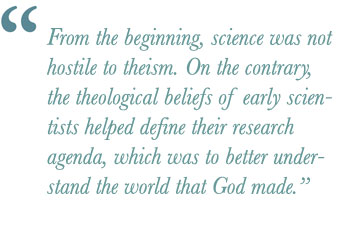 Thus, from the beginning, science was not hostile to theism. On the contrary, the theological beliefs of early scientists helped define their research agenda, which was to better understand the world that God made. Therefore, theology—like philosophy—has a vested interest in a complete understanding of our world. One of the key benefits that theology brings to the table is the open-mindedness to consider both physical as well as metaphysical explanations for the phenomena of the world. That is, theology is not willing to exclude any legitimate means for obtaining knowledge and finding truth.
Thus, from the beginning, science was not hostile to theism. On the contrary, the theological beliefs of early scientists helped define their research agenda, which was to better understand the world that God made. Therefore, theology—like philosophy—has a vested interest in a complete understanding of our world. One of the key benefits that theology brings to the table is the open-mindedness to consider both physical as well as metaphysical explanations for the phenomena of the world. That is, theology is not willing to exclude any legitimate means for obtaining knowledge and finding truth.
A Quest for Truth and Knowledge
It should come as no surprise that—like philosophy and theology—science, too, represents a quest for truth, a process conducted simply for the purpose of knowing things as they really are. Albert Einstein once said; “There exists a passion for comprehension, just as there exists a passion for music …. Without this passion, there would be neither mathematics nor natural science (Einstein, 1950, p. 13).”
Theoretical physicist Stephen Hawking (1988) put it this way:
[E]ver since the dawn of civilization, people have not been content to see events as unconnected and inexplicable. They have craved an understanding of the underlying order in the world. Today we still yearn to know why we are here and where we came from. Humanity’s deepest desire for knowledge is justification enough for our continuing quest. And our goal is nothing less than a complete description of the universe we live in.
This craving for understanding has led some scientists to think that science should be free to entertain questions and pursue answers that are beyond the naturalistic/material world. Physicist Sean Carroll (2017) has stated: “Science is sometimes described as adhering to methodological naturalism: choosing only to consider explanations that are grounded in the natural world, and to discount from the start possible interventions by non-natural phenomena” (p. 133). But Carroll doesn’t think science should be limited to the natural world. He insists that, “Science should be interested in determining the truth, whatever that truth may be—natural, supernatural, or otherwise (Ibid).”
Physicist Freeman Dyson (1988) agreed, in part, and suggested that the “ethic of science is supposed to be based on a fundamental open-mindedness, a willingness to subject every belief and every theory to analytical scrutiny and experimental test” (pg. 11, italics added for emphasis). But just how “open-minded” is science? As we will see, with few exceptions, science has clearly delimited its realm of study to the natural world—to the physical universe of material entities, fields, and forces.
What Should Science Seek?
Historically, science has been guided by methodological naturalism,4 which is popularly referred to as the “Scientific Method.” This method represents a strategy for studying the world, in which scientists look only for naturalistic causes in a physical world. In other words, for purely methodological purposes, scientists choose not to look for, nor consider, supernatural causes during the process of conducting experimental or other types of research. This is entirely legitimate for probing questions about the natural universe. However, when we seek knowledge and truth about the nature of all reality, which may include abstract, non-material, and metaphysical5 entities and concepts, the Scientific Method will not suffice.
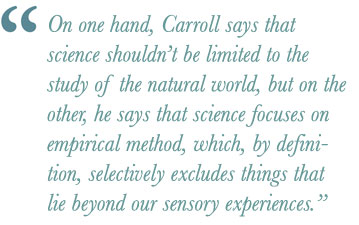
It is perhaps not surprising that, of all scientists, physicists seem to be the most concerned about the metaphysical aspects of the world. In my opinion, Carroll, Dyson, Einstein, and other physicists have often embraced a larger, expanded view of science because theoretical physics most often deals with abstract tools and concepts. These include mathematics and formal logic, but also other entities like quantum fields and subatomic particles. These are concepts whose axioms don’t fit neatly under empirical (i.e., sensory-based) methodology.
While Carroll (2017) acknowledges that science uses empirical methods to learn about the world (p. 134), he appears to miss the implication that empirical methodologies rely on observed objects being evident to our senses. In other words, on one hand, Carroll says that science shouldn’t be limited to the study of the natural world, but on the other, he says that science focuses on empirical method, which, by definition, selectively excludes things that lie beyond our sensory experiences (e.g., propositions, ideas, numbers, beliefs, thoughts, etc.).
Carroll makes an exception for mathematics and logic, whose answers are not grasped empirically. He concedes that they, too, can provide knowledge, but he is quick to point out that, neither mathematics nor logic necessarily arrives at truth:
Math is all about proving things, but the things that math proves are not true facts about the actual world… given a particular set of assumptions… certain statements inevitably follow… In logic, as in math, we start with axioms and derive results that inevitably follow from them (p. 132).
Carroll also confirms the same outcome for scientific theories:
But “theorem” doesn’t imply “something that is true”; it only means “something that definitely follows from the stated axioms” For the conclusion of the theorem to be “true,” we would also require that the axioms themselves be true (Ibid).
Carroll promotes naturalism through the use of a novel philosophical theory he calls, “poetic naturalism (p. 15ff).” This is an invention of Carroll’s that is supposed to guide us with “useful ideas” for describing the macroscopic or, “real” world. In other words, poetic naturalism is a way of talking about the world—an attempt to reconcile the apparent paradoxes between the impersonal viewpoint of naturalism and the goals and purposes of common human intuitions (Carroll, 2017; see also Niiler, 2016). In short, it is a way of making naturalism more palatable to the masses.
Carroll’s unique point of view notwithstanding, philosophy has long established a more conventional term: it is called ontological naturalism.6 Ontological naturalism is the antithesis of theism. While theism maintains there is a world beyond the natural physical world, naturalism says there’s nothing besides the physical world.
Methodological naturalism prefers empirical methods, which is entirely legitimate for studying the natural universe. But when scientists, or anyone else, assume the truth of ontological naturalism, they also naturally begin to reject anything and everything that does not fit that predetermined viewpoint. As candidly admitted by evolutionary biologist, Richard C. Lewontin (1997), many people take the side of science simply because of their prior commitment to materialism:7
It is not that the methods and institutions of science somehow compel us to accept a material explanation of the phenomenal world, but, on the contrary, that we are forced by our a priori adherence to material causes to create an apparatus of investigation and a set of concepts that produce material explanations, no matter how counter-intuitive, no matter how mystifying to the uninitiated.
Limits of Science
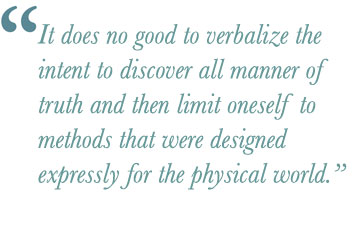 I fully agree with Carroll (2017) when he points out that naturalists should possess a healthy respect for what they don’t know. He states, “We don’t know how the universe began, or if it’s the only universe. We don’t know the ultimate, complete laws of physics. We don’t know how life began, or how consciousness arose (p. 28).” Indeed, there are a good many more things that will not be known, especially if one arbitrarily restricts oneself solely to methodological naturalism and exclusively to sensory modes of awareness. It does no good to verbalize the intent to discover all manner of truth and then limit oneself to methods that were designed expressly for studying the physical universe.
I fully agree with Carroll (2017) when he points out that naturalists should possess a healthy respect for what they don’t know. He states, “We don’t know how the universe began, or if it’s the only universe. We don’t know the ultimate, complete laws of physics. We don’t know how life began, or how consciousness arose (p. 28).” Indeed, there are a good many more things that will not be known, especially if one arbitrarily restricts oneself solely to methodological naturalism and exclusively to sensory modes of awareness. It does no good to verbalize the intent to discover all manner of truth and then limit oneself to methods that were designed expressly for studying the physical universe.
Not only are there many things for which science cannot provide answers, but there are many more things for which science will never provide answers with certainty. Astrophysicist, John Gribbin says, of the nature of scientific proof: “A scientific theory can never, strictly speaking, be proved correct. The best any theorist can hope for is that his or her theory will make a prediction that can be tested and found to be accurate to within the limits of observational or experimental error (Gribbin, 1986).”
Stephen Hawking (1988) agrees:
Any physical theory is always provisional, in the sense that it is only a hypothesis: you can never prove it. No matter how many times the results of experiments agree with some theory, you can never be sure that the next time the result will not contradict the theory. On the other hand, you can disprove a theory by finding even a single observation that disagrees with the predictions of the theory.
In short, a scientific theory is not proven when its predictions are verified. No matter how well supported a scientific theory may be, that theory is still refutable, and that refutation is refutable, ad infinitum. As philosopher Keith Parsons put it, “scientific hypotheses are always tentative; they are designed to be held only so long as they conform to the evidence (in Moreland, Nielsen, 1990, p. 190).”
This does not mean that we cannot acquire knowledge and truth via scientific methodologies, we can, but it does mean that every scientific finding must be capable of standing up to sustained rational reflection and critical examination to be considered as justified knowledge. Scientific conclusions are never “one and done.” Thus, science and scientific method are, in themselves, inadequate for helping us find final answers to every question.
Scientific Assumptions and Research Bias
Anyone who has ever written a Master’s thesis, doctoral dissertation, or has published a scientific paper, will be well acquainted with the nature of assumptions. An assumption is an assertion we believe, in principle, because it seems reasonable, self-evident, or very likely to be true, but for which there is no certainty of truth. A scientific assumption is a proposition or statement that is presumed to be true (Example: “All subjects were honest in answering questions on the medical history questionnaire”). Collectively, scientific assumptions undergird a necessary part of the framework of scientific discovery.
There are various kinds of assumptions that serve the scientific purpose. Within a scientific study, one typically must list all the assumptions that are inherent in one’s design. It is important to explain the assumptions and limitations in one’s research because it demonstrates that the researcher is aware of the weaknesses of the design, the factors that may influence the data, and the limits of generalizability of the results. All research includes such assumptions and limitations.
While all research starts with research questions, it also includes research hypotheses. A research hypothesis is essentially a guess (an educated guess, but a guess nonetheless) about how one thinks the research will turn out. It is a statement of conjecture, which is subject to the outcome of empirical testing. Basically, the research hypothesis boils down to how the researcher thinks the study results will turn out. This hypothesis represents the researcher’s bias because it is based on what she has read, what she thinks, and what she believes. However, lest anyone misunderstand, let me be clear about the nature of bias in scientific research. Assumptions and biases are an inescapable part of scientific discovery. It is not a question of whether researchers hold biases; everyone holds biases. The real question is whether the researcher will allow her bias to negatively affect how she collects, handles, analyzes, and reports the data. This is the true test of a scientist. Therefore, bias is not necessarily a problem in scientific research.
While bias may not necessarily be a problem, it does represent the potential for skewing, not only of the conclusions of scientific research, but also of the framing of the research itself. For example, the sources the researchers have read and referenced (or not read and not referenced) in the process of completing their review of literature will dictate how the study is framed, designed and conducted. This naturally leads to the following question: “Has the process of searching out, reading, and selecting these sources been influenced by prior beliefs and biases?” This is a legitimate question that may have an impact on the methods, procedures, data and conclusions of the study. When conducting their review of literature, writers often choose to read only (or predominantly) studies that agree with their own bias. This may affect how they choose what sources will be added to, or left out of, their final written report. Furthermore, this type of selection bias may be completely invisible to the person conducting the research. She may not be aware that her bias is influencing critical decisions in the research process. Hopefully, the peer-review process identifies these biases so as to suggest changes in design, or otherwise control potentially negative influence on the research.
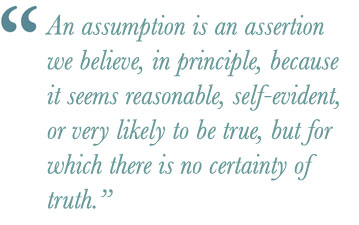 Besides the assumptions and biases that serve to structure and provide background for the study, there are also more assumptions that are specifically related to observation and measurement. Measurements are always made against a backdrop of metaphysical presuppositions, theoretical expectations and other kinds of underlying beliefs (Reiss & Sprenger, 2017 Scientific Objectivity). Whether or not any given procedure is regarded as adequate depends to a large extent on the purposes pursued by the individual scientist or group of scientists who are making the measurements and/or selecting the data for analysis. This underscores, once again, the permeating presence of assumption and bias in the Scientific Method. This also suggests the need for philosophy to critique the scientific enterprise (not to mention internal critique by scientists).
Besides the assumptions and biases that serve to structure and provide background for the study, there are also more assumptions that are specifically related to observation and measurement. Measurements are always made against a backdrop of metaphysical presuppositions, theoretical expectations and other kinds of underlying beliefs (Reiss & Sprenger, 2017 Scientific Objectivity). Whether or not any given procedure is regarded as adequate depends to a large extent on the purposes pursued by the individual scientist or group of scientists who are making the measurements and/or selecting the data for analysis. This underscores, once again, the permeating presence of assumption and bias in the Scientific Method. This also suggests the need for philosophy to critique the scientific enterprise (not to mention internal critique by scientists).
Finally, not only are there assumptions that form part of one’s specific research, but there are also general assumptions that underlie all of science. Listed below are some of the underlying assumptions of science. The most basic assumptions of scientific method are the first three, which are adapted from the University of California Museum of Paleontology website (Basic assumptions of science):
- The existence of a natural world that contains naturalistic causes; (i.e., All causes are naturalistic causes, which describe a naturalistic world.)
- The knowability of the natural world; (i.e., Evidence or data from the natural world can be used to obtain knowledge of that world.)
- The orderly nature of the natural world; (i.e., There is consistency, regularity, pattern, and structure in the causes that operate in the natural world.)
These naturalistic assumptions delimit the scope of science to the natural world. But, as Mark M. Hanna has clearly pointed out, “A decision to investigate the world in a naturalistic way does not entail that the world is naturalistic (1981, p. 70).” Assumptions are starting points that are taken for granted and therefore cannot be used to justify themselves. Scientific Method is a particular way of attempting to reach scientific objectives. But, a method can never dictate the nature of reality because it operates only on the basis of various assumptions.
In addition to the first three naturalistic assumptions, there are others that have been pointed out by philosophers of science. Some of these are listed below:
- Existence and discoverability of objective truth; (If there is no objective truth, it hardly makes sense to seek for it, regardless of the methodology.)
- Existence of ethical norms (e.g., That there will be honesty in reporting and not faking data, etc.);
- Necessary reliability of the personal powers of the scientist (This speaks to the trustworthiness of the scientist’s memory, her sensory faculties, her judgment, etc.);
- Validity of the basic laws of logic (i.e., law of non-contradiction, etc.);
- Necessity and validity of communication to others (science is a community project and data must be shared);
- Adequacy of language to describe the world;
- Existence of numbers;
- Free will (i.e., The freedom to choose one method of examining data over another, one statistic over another, one observation method over another, etc.).
Many of these assumptions have achieved a special status. That is, though they may be ultimately unprovable, they are considered methodologically necessary axioms, the validity of which has typically achieved consensus. As can be seen from this list, the second group of assumptions is mostly metaphysical in nature, which is why they have been the subject of great debate among philosophers and theologians for millennia. Further, most of these foundational assumptions have been identified and justified—not by science—but by philosophy, and to a certain extent by theology, thus showing the inherent compatibility between philosophy, theology and science. The wide array of specific and general assumptions (not to mention biases) can limit—sometimes severely—the generalizability and strength of conclusions of any given study. As noted earlier, this means that the hypotheses and theories derived from science remain uncertain, at best.
As you can see, there are many different kinds of assumptions and biases that relate to the outcome of any research. Science attempts to control these factors insofar as possible through a tight research design and through the use of peer reviewing to pick out the more grievous problems. Nevertheless, when one bases knowledge or scientific conclusions on premises or principles that have been assumed in advance, any outcome or conclusion can never be certain.
It is disconcerting when people, especially scientists, do not fully understand and appreciate the limits of science. Because of the number and types of assumptions, limitations, and biases that influence scientific research, there is a great potential for skewing of the results.
Regarding topics of study that lie outside the material world, scientists should seek the aid and advice of philosophers and theologians. When scientists abandon the realm of naturalistic laws and causes and make pronouncements about metaphysics, they cease being scientists and instead become philosophers and theologians. And yet, they often possess no apparent specialization in philosophy or theology, but merely have an interest in pontificating in domains for which they have little, if any, systematic and formal training.
There seems to be a natural tendency for all humans to hold beliefs about the nature of reality (i.e., metaphysics); and scientists are no exception. Einstein held this view: “I believe that every true theorist is a kind of tamed metaphysicist, no matter how pure a ‘positivist’ he may fancy himself (Einstein, 1950, p. 13).” And yet, metaphysics clearly represents the bailiwick of philosophy and theology. Perhaps it is not possible to be a scientist without making some conclusions or truth-statements about metaphysics. However, when a scientist promotes metaphysical beliefs under the guise of “science,” she sets aside methodological naturalism—the legitimate basis of scientific inquiry—which bears the marks of observability, repeatability, and testability of the natural world.
Conclusion
This essay was not an attempt to denigrate the veracity of scientifically gained knowledge. Nor was it an attempt to downplay the remarkable scientific achievements of the past century and beyond. Rather, it was an effort to balance our expectations of science with an understanding of the limits inherent in its methodology.
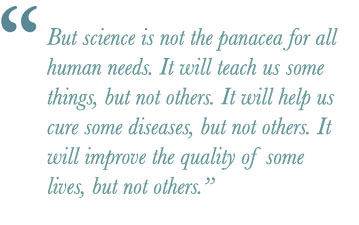 As one who was trained in the sciences and who has published research of his own, I understand the value of published research, not only to the scientific community, but also to the public at large. But science is not the panacea for all human needs. It will teach us some things, but not others. It will help us cure some diseases, but not others. It will improve the quality of some lives, but not others. Science is one of the tools that help us to understand our world, but there are also many others.
As one who was trained in the sciences and who has published research of his own, I understand the value of published research, not only to the scientific community, but also to the public at large. But science is not the panacea for all human needs. It will teach us some things, but not others. It will help us cure some diseases, but not others. It will improve the quality of some lives, but not others. Science is one of the tools that help us to understand our world, but there are also many others.
The validity of scientific predictions of the future may be more subjective than many scientists are ready to admit. Humankind’s reverence for scientific laws and theories may be rooted in its tendency to visualize a world that can be understood solely through one’s own rational powers. The breadth, depth, and precision of the scientific profession, along with tremendous advances in technology, have lured the unsuspecting public into believing that the explanations proposed by science are exhaustive and irrefutable, when, in fact, they may be neither. Scientific theory is dynamic and changing—what is lauded today as scientific breakthrough, may be discarded tomorrow, cast upon an ever-expanding scientific scrap heap.
The rational person would do well to be continually aware of the limits of scientific conclusions and of the need for science to cooperate with other disciplines—namely philosophy and, yes, even theology. If science, philosophy, and theology can effectively collaborate, they may together capture the best possible understanding of our world. These three domains of knowledge can exist harmoniously as long as none claim infallibility. The realities of the world are far too diverse in structure and behavior to be exhaustively identified, quantified, elucidated, or circumscribed by any one domain of knowledge. This means that scientists, philosophers, and theologians should be willing to develop worldviews that are holistic, balanced, and that carefully consider each other’s creeds and expertise.
References Cited
“Basic assumptions of science.” Understanding Science. University of California Museum of Paleontology. 10 January 2018 Retrieved from https://undsci.berkeley.edu/article/basic_assumptions
Carroll, S. M. (2017). The big picture: on the origins of life, meaning, and the universe itself. New York, NY: Dutton.
Dyson, F. (1988). Infinite in all directions. New York, NY Harper & Row.
Einstein, A. (1950, April). On the generalized theory of gravitation: an account of the newly published extension of the general theory of relativity against its historical and philosophical background. Scientific American, 182(4), 13-17.
Gribbin, J. (1986). In search of the Big Bang: quantum physics and cosmology. London: Heinemann.
Hanna, M. M. (1981). Crucial questions in apologetics. Grand Rapids, MI: Baker Book House.
Hanna, M. M. (2007). Reflections on the “God vs. Science” Debate. Retrieved from http://thingsibelieveproject.net/wp-content/uploads/2020/11/Reflections-on-God-Science-M-Hanna.pdf
Hawking, S. (1988). A brief history of time. New York, NY: Bantam Books.
Jaynes, J. (2003). The origin of consciousness in the breakdown of the bicameral mind. Boston, MA: Houghton Mifflin.
Lawrence, P. A. (2016, January 20). The Last 50 Years: Mismeasurement and Mismanagement Are Impeding Scientific Research. Current Topics in Developmental Biology, 116, 617-631. Article retrieved online through Europe PMC Funders Group: https://www.ncbi.nlm.nih.gov/pmc/articles/PMC4867218/
Lewontin, R. C. (1997, January 09). Billions and Billions of Demons. The New York Review of Books website. Retrieved January 8, 2018, from http://www.nybooks.com/articles/1997/01/09/billions-and-billions-of-demons/
Moreland, J. P., & Nielsen, K. (1990). Does God exist?: the great debate. Nashville, TN: T. Nelson.
Niiler, E. (2016, May 9). Maybe You’re Not an Atheist—Maybe You’re a Naturalist Like Sean Carroll. Wired, Retrieved from https://www.wired.com/2016/05/maybe-youre-not-atheist-maybe-youre-naturalist-like-sean-carroll/
Reiss, J. and Sprenger, J. “Scientific Objectivity”, The Stanford Encyclopedia of Philosophy (Winter 2017 Edition), Edward N. Zalta (ed.), Retrieved from https://plato.stanford.edu/archives/win2017/entries/scientific-objectivity/
About the Author
David P. Diaz, Ed.D. is the publisher and owner of Things I Believe Project. An educator and author, Dr. Diaz has a lifelong love of learning. His pen name (aka “Don Quixote”) comes from his love of chasing windmills (i.e., truth and other ideals) and his penchant for tongue-in-cheek humor: “Don Quixote was developing his arguments in such an orderly and lucid way that for the time being none of those listening could believe he was a madman.”
Footnotes
- Peter A. Lawrence has written an excellent summary of the factors that impede scientific research. This article can be found in the list of references and is titled, The Last 50 Years: Mismeasurement and Mismanagement Are Impeding Scientific Research (2016). It is well worth the read.
- “World” is defined in this essay as the sum total of everything that exists, including non-spatial, non-temporal abstract entities. In contrast, I will use the term “universe” to refer to the sum total of spatiotemporal objects (i.e., matter and energy), which are in some way accessible to the senses. The following terms will be used synonymously with “universe”: “natural world,” “physical world,” and “material world”
- A worldview represents a philosophical framework from which we view reality and make sense of life and the world. Our own worldview is a set of propositions (i.e., statements that express something that can be true or false) that we believe to be true about the world. This personal view, and the process by which one comes to hold it, can be especially crucial when it concerns life’s most important questions: “Can we know anything and, if so, how?” “What happens after death?” “What is truth and how do we apprehend it?” “What is a human being?” “What is the nature of reality?” “Are there moral absolutes and how do we know right from wrong?” “Do I have freedom of choice or are all my actions predetermined?” These are just some of the questions whose answers make up our personal worldview.
- Methodological naturalism: Historically, science has come to voluntarily limit its scope of study to the confines of the material world. This notion has expanded over the years to include not only material entities that are spatially extended, but also fields and forces. In this sense, methodological naturalism is often referred to as physicalism.
- Metaphysical is here used to refer to claims about the existence and nature of reality. That is, to claims about ultimate reality beyond the limitations of the empirical, space-time world. Anything that exists that is not made up of the material, space-time world may, in some sense, be considered metaphysical. Thoughts, ideas, concepts, numbers, propositions, and laws of logic may all represent extra-subjective metaphysical aspects of the world that do not consist of material entities, fields, or forces. They contain no spatial dimensions, no mass, and no weight. That makes them, by definition, a part of the metaphysical realm of knowledge.
- Ontological naturalism (not to be confused with methodological naturalism) is a materialistic/naturalistic philosophy that asserts that nothing that is supernatural, or transcendent to the space-time universe, exists. In other words, the natural world is the whole of reality. Of course, unlike methodological naturalism, which chooses not to look for nor consider supernatural causes in the study of the physical world, ontological naturalism is a philosophical position that presupposes that the only reality in the world is physical reality.
- Materialism is a philosophical theory that claims that all reality consists of one kind of thing and that all distinctions in the world are nothing more than various alterations of the single physical substrate. Many philosophers prefer to call the view “physicalism,” because this term is more inclusive, encompassing not only material entities that are spatially extended but also fields and forces. Most forms of atheism have materialistic presuppositions and are in one way or another a form of naturalism. In this essay, I am using the terms “materialism” and “ontological naturalism” synonymously, unless otherwise indicated.